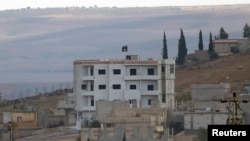Iraqi Kurdish fighters have joined the fight against Islamic State militants in Kobani, hoping their support for fellow Kurds backed by U.S.-led air strikes will keep the ultra-hardline group from seizing the Syrian border town.
Idriss Nassan, deputy minister for foreign affairs in Kobani district, said Iraqi Kurds using long-range artillery had joined the battle on Saturday night against Islamic State, which holds parts of Syria and Iraq as part of an ambition to redraw the map of the Middle East.
“The peshmerga joined the battle late yesterday and it made a big difference with their artillery. It is proper artillery,” he told Reuters.
“We didn't have artillery we were using mortars and other locally made weapons. So this is a good thing.”
Nassan did not elaborate and it was not immediately possible to verify that progress against Islamic State had been made.
The arrival of the 150 Iraqi fighters - known as peshmerga or “those who confront death” - marks the first time Turkey has allowed troops from outside Syria to reinforce Syrian Kurds, who have been defending Kobani for more than 40 days.
All eyes on Kobani
“They are supporting the YPG. They have a range of semi-heavy weapons,” said Jabbar Yawar, secretary general of the peshmerga ministry in the Kurdish region in northern Iraq, referring to the main Syrian Kurdish armed group.
Eyewitnesses in the Mursitpinar area on the Turkish side of the border from Kobani said two rockets were fired on Saturday night.
A Reuters witness said the fighting on Sunday was heavier than in the last two days, noting a strike in the late morning and the sound of three explosions.
Attention has focused on Kobani, seen a key test of the effectiveness of American air strikes, and of whether combined Kurdish forces can fend off Islamic State, an al-Qaida offshoot made up of Arabs and foreign fighters.
Air strikes have helped to foil several attempts by Islamic State, notorious for its beheading of hostages, to take over Kobani.
But they have done little to stop its advances, in particular in Sunni areas of western Iraq, where it has been executing hundreds of members of a tribe that resisted its territorial gains.
In addition to their deployment to Kobani, the Kurds are waging their own battle against the Sunni militants in Iraq.
While the Kurds have retaken some territory with the support of U.S. air strikes in the north, Islamic State faces limited resistance in Iraq's western Anbar province, where its militants last week executed over 300 hundred members of the Albu Nimr tribe because it had defied the group for weeks.
Since Islamic State declared a “caliphate” in large areas of Syria and Iraq in June, the militants have lost hundreds if not thousands of fighters in battles against other Sunni rebels, Islamist groups, forces loyal to Syrian President Bashar al-Assad and in U.S.-led air strikes.
Fighters inside the group say that it receives hundreds of volunteers every month, which helps it carry our more attacks. It also received pledges of allegiances from Islamist groups in places such as Pakistan, Africa and some Arab states.









